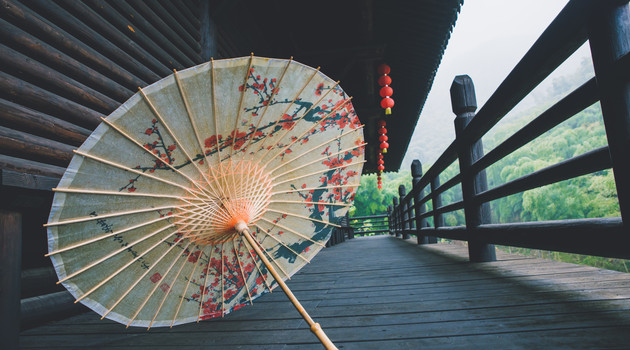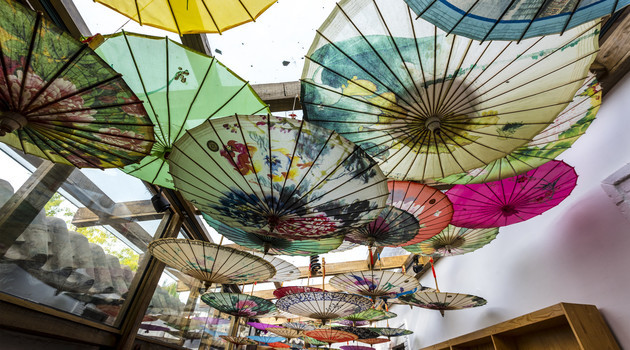
Photo/Shetuwang
Mar. 25 (NBD) -- Half an hour drive from Luzhou, southwest China's Sichuan province, lies "Sanli" - meaning where umbrellas reside - a cultural and tourism community modeled after an antique in Fenshuiling township.
This small town has an umbrella-making history that stretches back more than 400 years. For quite a long time in the past, almost each and every family there had made oil-paper umbrellas, passing on the time-honored craft.
Painted with tongyou - a kind of plant oil extracted from the fruit of the tung trees - to make umbrellas waterproof, Chinese oil-paper umbrellas are not just an instrument to ward off rain or sunlight, but also works of art embodying rich cultural significance and aesthetic value.
62-year-old Bi Liufu, a sixth-generation inheritor of traditional Chinese oil-paper umbrellas and the only national-level authorized inheritor of the craft, began to make oil-paper umbrellas since he was a child.
Bi said that oil-paper umbrellas used to be luxurious articles for daily use but also necessities of life. In the heyday of Fenshui Oil Paper Umbrella Factory (Fenshui Factory), 600-700 employees there produced 200,000 umbrellas annually.
A Fenshui oil-paper umbrella goes through a hundred procedures before it lands in people's hands. "Select, craft and soak the bamboo which is later dried in the sun, drilled, threaded and assembled into a skeleton. The paper is cut and glued onto the skeleton. It's trimmed, oiled and exposed to sunlight..."
However, in the 1980s, the mass-produced nylon umbrella, which is obviously lighter, more durable and cheaper, gradually replaced the hand-made oil-paper umbrella.
In the mid of 1990s, Fenshui Factory sold only several thousand umbrellas each year and couldn't pay the salaries. The youngsters started to give up on the craft and look for other jobs. The once red-hot umbrella-making business in Fenshuiling township gradually cooled down and the factory was standing on the brink of bankruptcy.
Bi took over the factory in 2000 but couldn't turn the table around. He at the time was pessimistic yet unwillingly to think that the oil-paper umbrella was about to disappear from the historic stage.

Photo/Shetuwang
The condition took a favorable turn in 2008, when the Fenshui oil-paper umbrella was listed as one of China's national intangible cultural heritages and Bi became the national-level inheritor of the handicraft.
With local government's efforts to protect and promote the traditional craft, the oil-paper umbrella becomes increasingly recognized and appreciated.
"Culturally enriched, the oil-paper umbrella is not only an article for daily use, but also a decorative item, an artwork, a souvenir and even a collection," said Bi Yuanshen, the only son of Bi Liufu.
An IT graduate, Bi Yuanshen gave up his job as a software engineer and went home to sell umbrellas in 2009. Taking charge of marketing, Bi Yuanshen used to participate in exhibitions across China to promote the brand and set up sales network.
Now, the made-in-Luzhou oil-paper umbrellas are sold to over 10 countries and regions via online and offline channels. Annual sales increases to current 100,000 from less than 10,000 in 2009.
Many other families in Fenshuiling township are returning to their old trade and oil-paper umbrellas are again seen exposed to sunlight along the old blocks of Fenshuiling township. The traditional craft begins to recover.
Proud to see the change, Bi Yuanshen said, "More people making oil-paper umbrellas allow diverse flowers to bloom."
Email: gaohan@nbd.com.cn


 川公网安备 51019002001991号
川公网安备 51019002001991号





